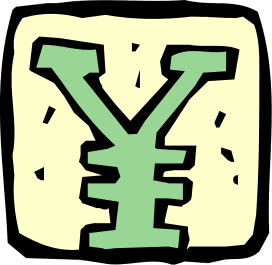 Cheap manufactured goods have been the mainstay of China’s exporting machine for years, but now leading bank ICBC (HKEx: 1398; Shanghai: 601398) looks poised to ride an equally lucrative new wave by shipping huge bundles of China’s currency, the yuan, to Africa. That’s the message I get from a report in today’s China Daily, citing an executive of South Africa’s Standard Bank, ICBC’s chief partner in Africa, talking about the huge growth potential for yuan services in Africa. Standard Bank’s China head Craig Bond says at least 40 percent of Africa’s trade with China, or about $100 billion worth, will be settled in the Chinese currency by 2015, adding at least $10 billion of Chinese investment in Africa will be denominated in yuan over the same period. While Bond never mentions ICBC by name, industry watchers know the two share a strong alliance through ICBC’s ownership of 20 percent of Africa’s biggest lender, and that the pair are strengthening their tie-up with ICBC’s recent plans to purchase 80 percent of Standard Bank’s Argentine unit. (previous post) China is currently using Hong Kong as its main base to explore internationalizing the yuan, but Africa is a logical extension for that policy, as China is one of the largest buyers of natural resources from the continent, and the market isn’t dominated by the dollar or the euro to the extent that more developed Western markets are. I’ve said before that I really like ICBC’s tie-up with Standard Bank, which gives it great access to developing markets in Africa and Latin America where ICBC has the potential to leverage its expertise as China’s largest bank. If even half of Standard Bank’s prediction comes true, it will mark a huge opportunity for ICBC, which, working with Standard Bank, most likely would become the major provider of yuan currency services to Africa, providing a huge new growth opportunity in its international expansion.
Cheap manufactured goods have been the mainstay of China’s exporting machine for years, but now leading bank ICBC (HKEx: 1398; Shanghai: 601398) looks poised to ride an equally lucrative new wave by shipping huge bundles of China’s currency, the yuan, to Africa. That’s the message I get from a report in today’s China Daily, citing an executive of South Africa’s Standard Bank, ICBC’s chief partner in Africa, talking about the huge growth potential for yuan services in Africa. Standard Bank’s China head Craig Bond says at least 40 percent of Africa’s trade with China, or about $100 billion worth, will be settled in the Chinese currency by 2015, adding at least $10 billion of Chinese investment in Africa will be denominated in yuan over the same period. While Bond never mentions ICBC by name, industry watchers know the two share a strong alliance through ICBC’s ownership of 20 percent of Africa’s biggest lender, and that the pair are strengthening their tie-up with ICBC’s recent plans to purchase 80 percent of Standard Bank’s Argentine unit. (previous post) China is currently using Hong Kong as its main base to explore internationalizing the yuan, but Africa is a logical extension for that policy, as China is one of the largest buyers of natural resources from the continent, and the market isn’t dominated by the dollar or the euro to the extent that more developed Western markets are. I’ve said before that I really like ICBC’s tie-up with Standard Bank, which gives it great access to developing markets in Africa and Latin America where ICBC has the potential to leverage its expertise as China’s largest bank. If even half of Standard Bank’s prediction comes true, it will mark a huge opportunity for ICBC, which, working with Standard Bank, most likely would become the major provider of yuan currency services to Africa, providing a huge new growth opportunity in its international expansion.
Bottom line: ICBC, working with African partner Standard Bank, looks set to reap big rewards from an expected explosion in demand for yuan services in Africa.
多年来,廉价的工业制品一直是中国的出口引擎,但现在看起来,中国工商银行(601398.SS; 1398.HK)找到了另外一条同样利润丰厚的道路:向非洲“输出”大量人民币。这是我从《中国日报》今天一篇报导得出的信息,该报称,工行在非洲的主要合作夥伴–南非标准银行一名高管称,非洲的人民币结算业务增长潜力巨大。南非标银中国首席执行官庞凯歌(Craig Bond)称,到2015年,至少有40%的中非贸易(约1,000亿美元)将以人民币结算,届时至少有100亿美元中国对非投资也将以人民币结算。尽管庞凯歌没有提及工行,但业内观察者知道,工行持有南非标银20%股份,两者合作关系紧密,而工行近期计划收购南非标银阿根廷分公司80%股权,将进一步巩固工行和南非标银的关系。中国大陆目前正以香港为人民币国际化的主要试点,但非洲是这一政策的合理拓展方向,原因是中国是非洲自然资源的最大买方之一,美元和欧元在非洲市场的主导程度不及西方发达国家。我此前说过,我非常欣赏工行与南非标银的联手,工行作为中国最大的商业银行,有望借此进入非洲和拉美的发展中国家市场,充分施展其专长。即使届时只实现南非标准银行预测值的一半,也将为工行创造巨大商机,工行与标准银行合作,很可能将成为非洲人民币结算业务的主要提供方,为工行海外拓展提供了巨大增长机遇。
一句话:人民币结算业务料将在非洲呈爆发性增长,工行通过与南非标准银行的合作,势将获益匪浅。
Related postings 相关文章:
◙ Record Profits Bolster Banks as Storm Looms 创纪录利润有助银行抵御楼市低迷隐忧

 Eight months after the news first broke, we’re finally getting a little more color on the potentially devastating lawsuit filed against telecoms equipment and cellphone maker ZTE (HKEx: 763; Shenzhen: 000063) by global rival Ericsson (Stockholm: ERICb), and things don’t look as bad as they did initially. Few details were given when Ericsson filed the suit in Britain back in April, but the action had the potential to halt ZTE’s sales in major European markets. (
Eight months after the news first broke, we’re finally getting a little more color on the potentially devastating lawsuit filed against telecoms equipment and cellphone maker ZTE (HKEx: 763; Shenzhen: 000063) by global rival Ericsson (Stockholm: ERICb), and things don’t look as bad as they did initially. Few details were given when Ericsson filed the suit in Britain back in April, but the action had the potential to halt ZTE’s sales in major European markets. ( It’s quite a slow news day as we head into the final days of summer before the new school year begins, so I thought I’d dust off my “China Makes Up Its Mind” column with a discussion of much-needed reform of China’s penality system for companies that break the law. Not surprisingly, the calls for reform, while still somewhat muted, are coming in response to violations by a foreign company, in this case US oil giant ConocoPhillips (NYSE: COP), whose leaking oil wells are causing potentially devastating damage in the Bohai Bay off the coast of Shandong province. Under the current system, ConocoPhillips will face maximum fine of 200,000 yuan, or a mere $31,000, for this environmental nightmare that has caused much more damage to the environment and people’s livelihoods. (
It’s quite a slow news day as we head into the final days of summer before the new school year begins, so I thought I’d dust off my “China Makes Up Its Mind” column with a discussion of much-needed reform of China’s penality system for companies that break the law. Not surprisingly, the calls for reform, while still somewhat muted, are coming in response to violations by a foreign company, in this case US oil giant ConocoPhillips (NYSE: COP), whose leaking oil wells are causing potentially devastating damage in the Bohai Bay off the coast of Shandong province. Under the current system, ConocoPhillips will face maximum fine of 200,000 yuan, or a mere $31,000, for this environmental nightmare that has caused much more damage to the environment and people’s livelihoods. ( The unruly and ultra-competitive group buying space could soon add tax evasion to its growing list of woes, with a new report saying the turbulent sector may owe more than 500 million yuan, or $77 million, in unpaid taxes. (
The unruly and ultra-competitive group buying space could soon add tax evasion to its growing list of woes, with a new report saying the turbulent sector may owe more than 500 million yuan, or $77 million, in unpaid taxes. ( Fast food giant McDonald’s (NYSE: MCD), clearly worried about its perennial second-place status in China to Yum Brands’ (NYSE: YUM) KFC, looks set to launch a major new drive on the franchising front, a move fraught with risk that could easily do more harm than good in this immature market. McDonalds managers are most likely frustrated by the fact that despite entering the market just a few years after Yum, they now have just 1,300 stores in China, all self-owned, compared with nearly 3 times that amount, or 3,200 stores, for Yum. In an effort to accelerate their growth, the company is stepping up its franchising program by turning over its 11 self-owned stores in southwest Yunnan province to a local franchise partner, Kunming Northstar Enterprise Co, which will also be allowed to open new stores on its own under a franchise license. (
Fast food giant McDonald’s (NYSE: MCD), clearly worried about its perennial second-place status in China to Yum Brands’ (NYSE: YUM) KFC, looks set to launch a major new drive on the franchising front, a move fraught with risk that could easily do more harm than good in this immature market. McDonalds managers are most likely frustrated by the fact that despite entering the market just a few years after Yum, they now have just 1,300 stores in China, all self-owned, compared with nearly 3 times that amount, or 3,200 stores, for Yum. In an effort to accelerate their growth, the company is stepping up its franchising program by turning over its 11 self-owned stores in southwest Yunnan province to a local franchise partner, Kunming Northstar Enterprise Co, which will also be allowed to open new stores on its own under a franchise license. ( es. But in this case, Wang only holds 8.6 percent of Tudou shares, and is clearly under continued pressure to raise cash, as evidenced by his determination to go ahead with this IPO despite negative market sentiment. Many will recall that Sina has a poor record with major M&A, failing to close its purchase of Focus Media (Nasdaq: FMCN) several years ago and also fending off a hostile takeover bid by Shanda Interactive (Nasdaq: SNDA) before that. This Tudou purchase could be a more careful attempt to see how the markets react before making an outright offer for the company. Given the sudden interest in video sharing by nearly every major Internet company, including Tencent (HKEx: 700), which is reportedly in talks for a stake in industry leader Youku (NYSE: YOKU) (
es. But in this case, Wang only holds 8.6 percent of Tudou shares, and is clearly under continued pressure to raise cash, as evidenced by his determination to go ahead with this IPO despite negative market sentiment. Many will recall that Sina has a poor record with major M&A, failing to close its purchase of Focus Media (Nasdaq: FMCN) several years ago and also fending off a hostile takeover bid by Shanda Interactive (Nasdaq: SNDA) before that. This Tudou purchase could be a more careful attempt to see how the markets react before making an outright offer for the company. Given the sudden interest in video sharing by nearly every major Internet company, including Tencent (HKEx: 700), which is reportedly in talks for a stake in industry leader Youku (NYSE: YOKU) (